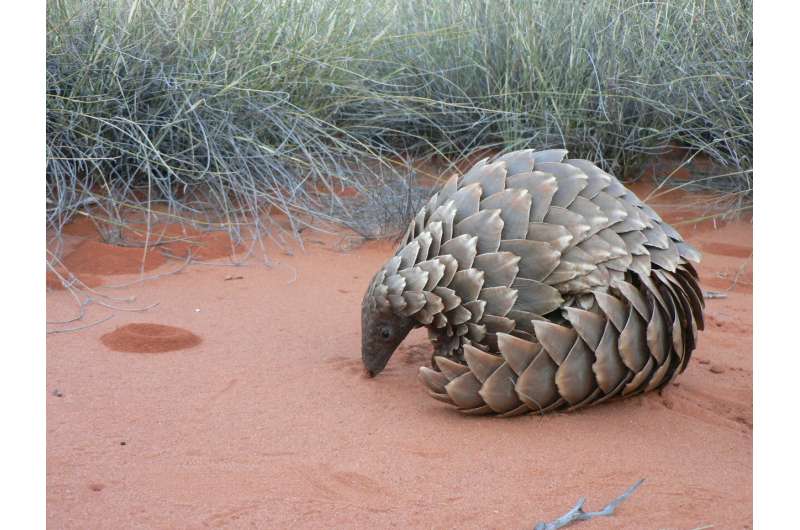This article has been reviewed according to Science X's editorial process and policies. Editors have highlighted the following attributes while ensuring the content's credibility:
fact-checked
peer-reviewed publication
trusted source
proofread
New research into pangolin genomics may aid in conservation efforts

A new paper in Molecular Biology and Evolution provides, for the first time, a comprehensive set of genomic resources for pangolins (sometimes known as scaly anteaters) that researchers believe will be integral for protecting these threatened mammals.
The work
is titled "Pangolin genomes offer key insights and resources for the world's most trafficked wild mammals." Pangolins, which are found in Asia and sub-Saharan Africa, are the only mammals covered in scales. They are trafficked at record numbers for their meat and supposed medicinal properties. The animals are also at risk due to widespread deforestation of their native habitats. Pangolins are made up of eight surviving species that have become of great public interest and
Despite their dire conservation circumstances, pangolins are understudied, with major gaps remaining in basic species or population research. Researchers are now focusing increasingly on genomics in wildlife research because it provides data for more accurate information on species or population demarcation, demographic information, diversity, historical trajectories, and animals' adaptive capacity to global changes. It can also help trace the origins of illegally traded individuals in order to more effectively determine poaching hotspots and disrupt trafficking networks.
Producing genome-wide information about pangolins is a challenging task. First, the geographic isolation of pangolin species from each other and limited fossil records pose methodological obstacles. The Asian and African pangolin species diverged some 37.9 million years ago, making it difficult to truly understand the group's evolution when using a reference genome of a distant species. Second, the animals' elusive behavior and tropical distributions make genetic sampling expensive and time-consuming.
Researchers here sequenced, assembled, and annotated the first reference genome for giant pangolin, which is native to Africa, and also sequenced and assembled genomes for the black-bellied, Temminck's, Indian, and Philippine pangolins. These new genomic data, along with previously published information on the remaining three species—the white-bellied, Sunda, and Chinese pangolins—provide the first complete set of genomes for pangolins. During this process, researchers here also identified a potentially new pangolin species from previously released genomic data.
The researchers believe that this information, which will eventually provide complete information about how pangolins evolved over time in response to changing environmental conditions, will provide crucial details about how to protect the animals effectively through conservation priorities and management plans in coming years. The outputs will also be useful for developing DNA toolkits for tracing the pangolin trade.
"The collaborative manner of this study from authors spanning Africa, Asia, and Europe allowed us for the first time to have a deep look into pangolin evolution across all eight species using a genome-wide lens," said Sean Heighton, one of the paper's authors. "We hope that these genomes will be the basis for further genetic research that will aid in conservation of the animals."
More information: Sean Heighton et al, Pangolin genomes offer key insights and resources for the world's most trafficked wild mammals., Molecular Biology and Evolution (2023). DOI: 10.1093/molbev/msad190. academic.oup.com/mbe/article-l … .1093/molbev/msad190
Journal information: Molecular Biology and Evolution
Provided by Oxford University Press



















